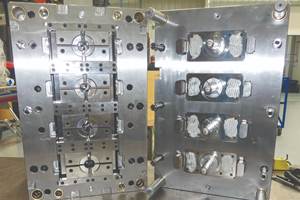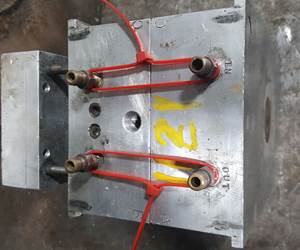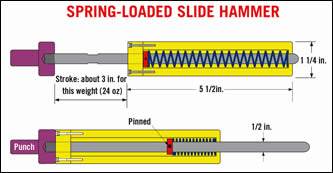Seven Habits of Highly Effective Mold Maintenance Supervisors
A review of what mold repair technicians believe a mold maintenance supervisor should bring to the table.
The first installment of this two-part series (April issue, page 46) dealt with habits that help repair technicians perform their job better and faster. The seven “habits” were collected through an informal poll of tradesmen, managers and supervisors with many years of experience repairing molds at a bench or managing repairs for a variety of companies.
Since mold repair technicians and their supervisors work as a team—most of the time—to keep molds running, it is only fair that actions from the white shirt side of the bench also be considered for effective habits that improve toolroom communication, repair efficiency, mold and personnel performance and morale. With that in mind, this same group was asked what they believe a mold maintenance supervisor should bring to the table, and to provide a short overview of the types (experience, background) of managers they have been associated with during their careers.
As typical, the responses were varied among the young and old managers with each expressing the virtues of college degrees versus experience—and in some cases the unique individual with both.
Two Types of Managers
The responses clearly reveal that those polled come from mostly two differing types of backgrounds. Some are right out of college with book smarts, scientific theories, computer skills and fresh ideas on improving shop efficiencies. On the opposite end—as in baby boomers—many started out in a machine shop early in life and worked their way into a management/maintenance position. Also impacting management styles is of the type of training, manufacturing environment (medical or dog foods bowls) and hard lessons learned from doing the job. But all agreed that the final check is simply—results. Results? Results of what? Mold performance? Missed shipments? Customer returns? Tooling usage? Labor hours? Scrap? The prevailing barometer is different for many shops.
The interesting fact was that the younger, PC savvy managers seemed to strive for data to measure for results—they are just not sure what to measure. The boomers seem to—as a whole—disregard this method and instead base good or bad shop performance on “what hot jobs got fixed this week”. “Hot” being the operative word here. Does hot mean unscheduled breakdowns or change-overs? Last-minute schedule changes or molds arriving from another vendor? This is fodder for another article.
Two Schools of Thought
In this poll, there were two prevailing schools of thought concerning the necessary requirements of an effective maintenance supervisor. First, is that a good manager can manage any kind of department—even a maintenance team consisting of grizzled, experienced tradesmen—by being good with people, organized and let the data do your talking.
The other is that it takes someone with years of hands-on bench experience solving mold issues to be effective simply because it takes this kind of knowledge to be able to make accurate, unbiased decisions when managing a fleet of molds.
Seven Daily Habits
Following is a list of seven daily habits to include—the most mentioned, or in some cases, the most vehemently defended. Here they are in order of frequency:
- Promote working communication between repair technicians.
• Many times repair technicians exist only in their own worlds—or bench—oblivious to what someone else is doing or how they do it. Mold experience (tips and techniques) needs to be shared among those performing the job. - Promote a systemized approach.
• Freelancing repairs leads to inconsistent practices and results. There might be many different ways to disassemble, clean and reassemble a mold, but one technique will work best and should be standardized among technicians. - Continuously strive for the proper tools and machinery to perform mold repair more efficient and accurately.
• Use your CMMs to cost justify (ROI is the only argument bean counters understand) the necessary tools to clean and repair molds. Simply saying “we need this” won’t work in today’s lean manufacturing environment. - Prioritize mold work wisely.
• Don’t job-hop your technicians. Pulling a repair tech off one job to hurriedly start another is frustrating, confusing and can lead to mistakes that cause unscheduled mold stops/breakdowns through incorrect mold assembly. - Run a professional shop.
• Trying to be “one of the boys” complicates the working relationship and can render job assignments suspect. Be a mentor to the younger techs and be conscious of older tech skill “specialties”. - Train your techs.
• Keep your techs and yourself abreast of new technologies that can impact the effectiveness of their skills and job performance. Attend seminars, trade shows and conferences to expose your techs to other methods of work from which your shop can benefit. - Be an active manager.
• Discuss maintenance plans, talk to processors and do whatever it takes to promote teamwork and knowledge sharing. There is no place for prima donnas in today’s toolroom.
These seven habits—and whether young or older, and practiced daily—will bring your team together and allow managers to focus on a larger picture while trusting repair technicians to make smarter, better thought out decisions when operating on the life support systems—that we call molds—of your company.
For more information from MoldTrax call (419) 289-0281, e-mail Sales@MoldTrax.com.
Related Content
Precision Welding Services Offer Rapid Turnaround Mold Repair and Reduced Molder Downtime
X-Cell Tool & Mold relies on outsourced, high-quality welding repairs from Lewis-Bawol Welding to ensure its customers' molds are back in production quickly and affordably.
Read MoreWhat You Should Know About Injection Mold Safety Straps
Every mold should have one in order to be safe and OSHA compliant.
Read MoreHands-on Workshop Teaches Mold Maintenance Process
Intensive workshop teaches the process of mold maintenance to help put an end to the firefighting culture of many toolrooms.
Read MoreThink Safety: Eliminate Hazards Throughout the Shop
The tooling community is taking advantage of new products for safer mold shops and molding facilities.
Read MoreRead Next
Everything You Wanted to Know About Mold Maintenance
Welcome to a new column dedicated to improving efficiency in your tool room and the health and performance of your molds.
Read MoreReasons to Use Fiber Lasers for Mold Cleaning
Fiber lasers offer a simplicity, speed, control and portability, minimizing mold cleaning risks.
Read More

















